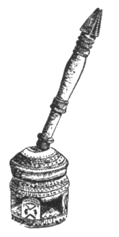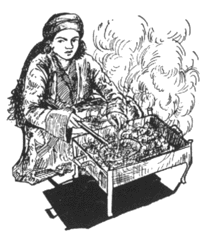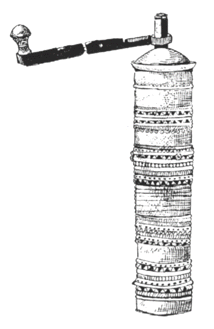
|
[Contents]c. ARABIC COFFEE
Serving cups are small for the beverage itself is strong and a few sips suffice. The average coffee cup holds about one quarter of a standard measuring cup. The cups used in Lebanon are sman versions of the demi tasse. In some of the other Arab countries the cups have no handles. More elaborate coffee set include small brass cups into which the china cups which actually hold the coJfee are fitted. A serving tray and pot for making the coffee match the brass cups. These decorative sets are becoming less common nowadays, and an antique set is a good investment for trauellers. The best Arabic coffee is that made from freshly roasted and ground beans. Many people like to roast and grind the beans them selves to the exact degree of their 3 individual preference. Some connoisseurs like the Mocha beans from Yemen because of their delicate f lavor and rich aroma. Others prefer the beans of Brazil which are said to have the richest flavor of all. Usually several kinds of beans are blended together. Purists in the art of making Arabic coffee insist that the beans be roasted over a charcoal fire and ground in a stone mortar. They contend that both of these operations should be performed within a few minutes before the coffee is to be brewed so that all the flavor is retained. However, a very popular method of grinding beans purchased already roasted is in the cylindrical brass grinder, made in Damascus.
Sugar is stirred into the beverage during its brewing and not when it is served, as with other styles of coffee. The amount of sugar which is added must be appropriate to the occasion. The more sugar, the happier the occasion, with the exception that coffee served after dinner at any time is usually only slightly sweetened. At weddings, betrothals, christenings or birthdays, sweet coffee is always prepared. At the time of death or other sorrow, it is always bitter. A guest has the privilege of saying how much sugar he prefers. His host or hostess will ask for a guest's preference before ordering the coffee to be made. When replying in the Arabic spoken in Lebanon the guest will specify hilweh (sweet), murrah (without sugar) or mazboutah (medium). In Turkish one says shekerli (sweet), shekersuz (without sugar), or orta (medium). The usual method of making Arabic coffee calls for dissolving the sugar in the water before adding the powdered coffee. Ordinarily one level teaspoon of sugar and one heaping teaspoon of ground coffee are used with each coffee cup of water per serving.
A small pitcher of orange blossom essence may be served with the
coffee so that the guest may add a few drops to flavor his cup. Some
people like to add several cardoman seeds to the pot while the coffee
is brewing. The cardoman flavor always distinguishes the coffee
served in Saudi Arabia. There the guest is served as many cups of
coffee as he wishes, but it is not customary in Lebanon to offer a
second cup of Arabic coffee at one sitting.
|

960118/980607
 The long handled
aluminum, brass or enamelware pot in which the coffee is brewed may
hold up to a half dozen servings but not more. The coffee is always
best when made in small quantities.
The long handled
aluminum, brass or enamelware pot in which the coffee is brewed may
hold up to a half dozen servings but not more. The coffee is always
best when made in small quantities. Coffee serving is a ceremony. Rules of etiquette on this subject
require the hostess to personally hand around the cups although a
servant may assist by holding the tray. When only men are present the
host will hand each cup to his guests. The eldest or the most
important person in the room is served first. Age takes preference, if
there is some doubt as to rank. In former times a man was always
served before a woman but that custom is usually reversed today.
Coffee serving is a ceremony. Rules of etiquette on this subject
require the hostess to personally hand around the cups although a
servant may assist by holding the tray. When only men are present the
host will hand each cup to his guests. The eldest or the most
important person in the room is served first. Age takes preference, if
there is some doubt as to rank. In former times a man was always
served before a woman but that custom is usually reversed today. The water and sugar are boiled together until clear. Next, the ground
coffee is added and stirred well. The mixture is allowed to boil up
until the foam rises to the top of the pot. Now the pot is removedfrom
thefire by means of its long handle and struck sharply on the side of
the stove to reduce the foaming. The pot is returned to the fire and
allowed to boil up two more times. As it is removed for the third time
a few drops of cold water may be added to aid in settling the grounds.
It is poured immcdiately into the small serving cups. It must be
poured out before the grounds settle back down to the bottom of the
pot.
The water and sugar are boiled together until clear. Next, the ground
coffee is added and stirred well. The mixture is allowed to boil up
until the foam rises to the top of the pot. Now the pot is removedfrom
thefire by means of its long handle and struck sharply on the side of
the stove to reduce the foaming. The pot is returned to the fire and
allowed to boil up two more times. As it is removed for the third time
a few drops of cold water may be added to aid in settling the grounds.
It is poured immcdiately into the small serving cups. It must be
poured out before the grounds settle back down to the bottom of the
pot.